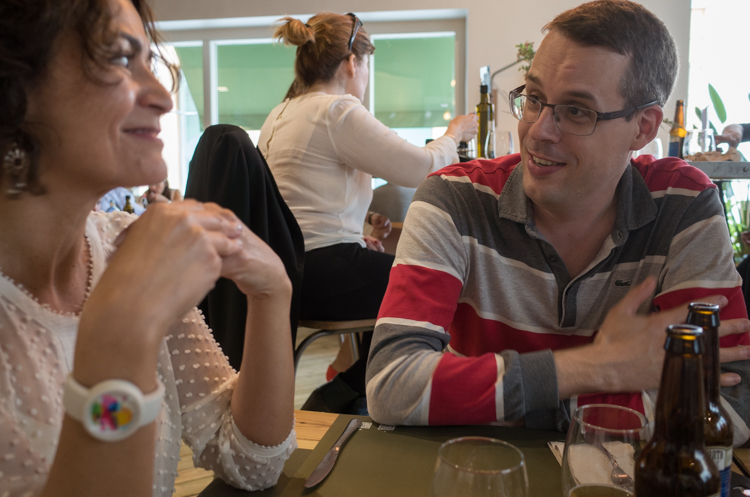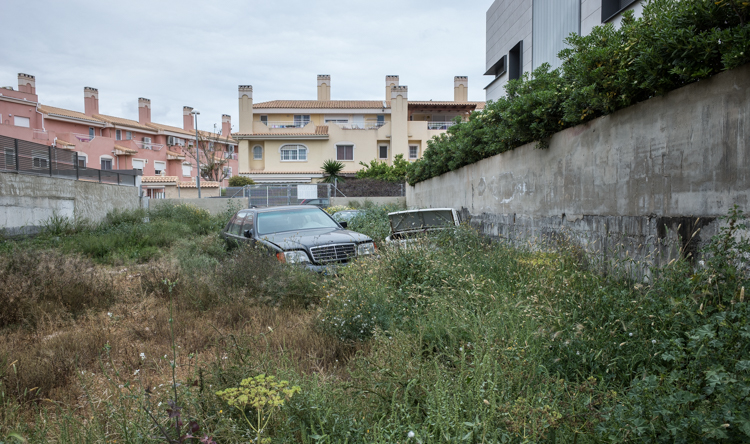The week began in Copenhagen and ended in Alicante. I present the images chronologically.
17_1
On Sunday morning my sister and I went to the Jewish cemetery for a last visit (this time around) of my father’s grave. I always find the contrast in this image visually amusing. Behind the cemetery there is a kindergarten, whose inscription, “børn i bevægelse” means something like “children on the go”:

17_2
I placed another stone on my father’s grave, and then we drove to the centre of Copenhagen:

17_3
We walked down the pedestrian street, Strøget. Following the various terrorist attacks around Europe using cars and trucks as weapons, concrete barriers have been placed strategically to prevent something similar from happening here:

17_4
I wonder what Nike thinks of this t-shirt:

17_5
Construction fence, indicating where it is OK to pee and where it is not:

17_6
Anti-Putin sticker in Russian; apparently a remnant from a rally some time ago, given how faded it is:

17_7
My sister and I were meeting up for lunch with Marek and Tamara. But first, we visited a wonderful event in Copenhagen’s magnificent city hall. It was an exhibition about people who had come to Denmark as political refugees in the past several decades. The exhibition consisted of portraits and stories, but also some of the people depicted were on hand and you could book 10 minutes with each of them to hear their story and ask questions:

17_8
I would have loved to meet this man but unfortunately he was not there in person:

17_9
Marek and Tamara listen to a man from Bosnia:

17_10
I had the pleasure of speaking with three of the ex-refugees. First, Nidal from Iraq, who came to Denmark in the 1990s:

17_11
Musse came to Denmark from Somaliland in 1992. He loves his adopted country and is one of the most positive persons I have ever met:

17_12
Quyen was a Vietnamese boat refugee in the 1980s. She was rescued by a Danish merchant ship:

17_13

17_14
Afterwards, we went for lunch at Ankara, a Turkish restaurant next to Copenhagen’s main synagogue, a place that used to be one of my father’s favourites:

17_15
After lunch, we walked around a bit more, and then we said goodbye. My sister went home with Marek and Tamara (she was staying in Copenhagen for a few more days) while I drove to the airport, returned my rental car and checked in for my flight home. The last images from this visit to Copenhagen are of this Lego tourist in the departure hall:

17_16

17_17
Back in Alicante, on Monday night we met up with some visiting friends for drinks and dinner. While having a drink at a bar in Plaza de Correos in the centre, I took several pictures of a lady at one of the other tables. It seems that she was aware and did not mind, perhaps because I was using a small and discreet camera, the Ricoh GRII:

17_18
While arriving at work on Tuesday morning, I noticed this beautiful vintage BMW motorcycle in our parking garage. While my two-wheeled riding is on a muscle powered bike these days, I still very much appreciate beautiful machines like this:

17_19

17_20

17_21
Also on Tuesday, we received a visit by Marc, a German guy who used to work on my team until he left four years ago. He was back in town on a brief break, and we took him to lunch at the Bhodigreen veggie restaurant:

17_22
My dish at Bhodigreen, a Malaysian curry called Laksa Umpur Lumpur:

17_23
Thursday was a public holiday in Alicante, Santa Faz. The Santa Faz monastery is eight kilometres from the centre of Alicante. Inside, there is a relic brought from the Vatican in the 15th century which, according to popular tradition, is the veil with which Veronica wiped the blood from Jesus’ face on the way to the Calvary. Every year, thousands of people head there on a pilgrimage from Alicante on the second Thursday after Easter Sunday, and it is one the city’s most traditional local fiestas. The event is basically religious, but for most of the participants it is more about local tradition and just having fun. I last documented the event in 2013. I was thinking of going this year, but the weather was bad, so I skipped the main event. Instead, I went down to the beach in the afternoon to see the aftermath of the party the local teenagers have down there after the procession. This giant botellón is also part of the Santa Faz tradition:

17_24
The shopping carts are used to transport the necessary supplies during the walk from city centre to the monastery and afterwards down to the beach (another 2.5 km or so). After the party, they are abandoned on the beach promenade:

17_25
By 6 p.m., the party is very much winding down (it has been going on since 8 a.m., after all) and the cleanup of the beach is in full swing:

17_26

17_27
The shopping carts are picked up and transported back to the respective supermarkets:

17_28
Then a long weekend arrived (I had taken Friday off, and the following Monday was Labour Day). It was a quiet few days. I walked Cheeta in the mornings and looked after little details, like this snail on my street:

17_29
My wife and I played a round of golf, and I was amused to see this vacant lot in an upscale subdivision turned into a mini car junkyard:

17_30
And of course I went cycling in the hills. It was not bright sunshine the whole weekend but the grey clouds just made Busot look more colourful:

17_31
A track in a field near Jijona:

17_32
My personal playground, the road between Busot and Jijona:

17_33
A flock of grazing sheep near El Campello:

17_34
I am always amazed to see how one man and one dog control such a large flock of animals:
